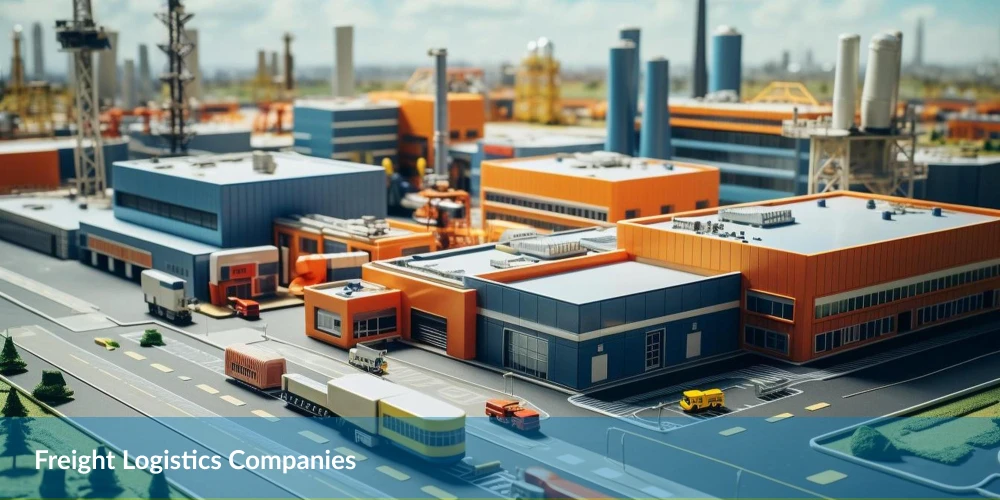Table of Contents

Freight logistics companies are the architects behind the scenes, orchestrating the seamless movement of goods across the globe. Their operations are pivotal to the efficiency of the shipping industry, as they streamline processes, mitigate risks, and ensure that products reach their destinations in a timely, cost-effective manner.
As enablers of supply chain management, these firms deploy an array of core services, from transportation and warehousing to inventory management and order fulfillment. Such services connect different stages of the supply chain and optimize the flow of information, capital, and products. Navigating the complexities of international trade, these entities adjust to the intricacies of various industries, aiming to redefine the essence of global commerce through their strategic logistical solutions.
Types of Freight Services
Diversity in freight services addresses the varying needs of shippers and consignees. Each type of service, from Less Than Truckload (LTL) to Full Truckload (FTL), offers specific benefits tailored to shipment size, routing, and timing requirements. LTL shipping enables multiple shippers to share space on a single truck. In contrast, FTL is reserved for one shipper with enough cargo to fill an entire truck.
Less Than Truckload (LTL) and Full Truckload (FTL) Services
- LTL accommodates smaller shipping volumes, reducing costs for shippers by only paying for the space their cargo occupies.
- FTL is optimal for larger shipments that need dedicated space or when shippers prioritize a faster delivery timeline.
Intermodal Transportation Advantages
Intermodal transportation combines rail, ship, and truck modes for efficient cargo movement. The integration leads to cost savings, increased safety, and environmental benefits due to reduced carbon emissions. Freight logistics companies implement this by coordinating complex routing schedules to ensure timely delivery.
How Freight Companies Tailor Services to Client Needs
Freight logistics companies work closely with clients to craft custom solutions. They analyze shipment details, destination, budget, and time constraints. Services extend beyond transportation, encompassing packaging, warehousing, and inventory management, designed to streamline clients’ supply chain operations.
Global Supply Chain Management
Freight logistics companies have become indispensable in global supply chains, seamlessly integrating their services to ensure goods’ fluid and uninterrupted movement across international boundaries. These companies do not merely transport goods; they orchestrate the complex international trade symphony.
Integration of Freight Logistics Companies into Global Supply Chains
In an elaborate global market, freight logistics companies stand at the forefront, driving integration efforts that connect various modes of transportation and diverse sectors. Their adeptness in linking air, sea, road, and rail systems with warehousing and distribution channels results in a cohesive global supply chain. Their coordination guarantees that products sourced from multiple countries arrive at their destinations through the most efficient routes, leaving consumers with a myriad of global products at their fingertips.
Role of Logistics Companies in Managing Complex International Networks
Logistics companies are the linchpin in managing the labyrinthine networks inherent in international trade. By crafting advanced logistical strategies, they handle the intricacies of multiple regulatory environments, cultural nuances, and intricate customs procedures. Their expertise ensures that legalities in each country are navigated with precision, thereby avoiding unnecessary delays. Moreover, they optimize supply chain performance through continuous analysis and adaptation to the dynamic demands of global markets.
- Logistics companies wield sophisticated technology to track goods, offering real-time visibility to their clients.
- They cultivate an exhaustive understanding of international logistics, which translates to reduced costs and increased reliability.
- The strategic placement of goods in various distribution centers and warehouses worldwide exemplifies their proactive approach to managing supply chains.
Interactive elements like a tracking dashboard maintain client engagement and provide invaluable insights into logistics performance. Clients reflect on the benefits of such transparency, often resulting in enhanced trust and long-term partnerships. Logistics companies must remain vigilant, adapting to the ever-changing landscapes of global trade to ensure their clients’ success.
Demystifying Freight Rate and Pricing Strategies
Freight logistics companies utilize a multifaceted approach to determine pricing, considering various factors that influence the cost of transportation services. One of the primary considerations involves the mode of transport chosen, whether air, ocean, rail, or road, each with its unique pricing structure.
How Freight Logistics Companies Determine Pricing
To establish freight rates, companies assess the cost of moving goods, including expenses directly associated with the shipping process and indirect costs related to business operations. Fixed costs such as warehousing, equipment, overhead, and variable costs like fuel consumption must be considered. Moreover, value-added services such as packaging, loading, and unloading also play a pivotal role in pricing.
Various Pricing Strategies
Freight logistics firms adopt different pricing strategies to remain competitive while ensuring profitability. A volume-based pricing model benefits customers with larger shipments through discounted rates, encouraging more substantial transport volumes. The distance traveled is another decisive factor in cost calculation, with longer distances generally resulting in higher charges.
Weight is also a critical metric, particularly in shipping goods requiring specialized handling due to their heavy or bulky nature. Dimensional weight pricing has become a norm for carriers, especially in air freight, where space is a premium commodity. This pricing considers the actual weight and the cargo’s space.
- Volume-Based Pricing: Offering discounts to shippers who move larger volumes, encouraging repeated business.
- Distance Pricing: Calculating costs based on the mileage between origin and destination.
- Weight and Dimension Pricing: Determining rates factoring in the shipment’s weight and spatial footprint.
Companies further tailor their strategies by incorporating tariffs reflecting current market demand. Fluctuating fuel prices are also a constant consideration, often addressed with fuel surcharges that adjust in real-time with market conditions.
Risk assessment is integral, accounting for the potential volatility in international markets or political climates that may affect cost. Clients may encounter varying rates due to seasonal changes, known as peak season surcharges, particularly in consumer-driven markets with increased demand at certain times. As supply chains become ever more complex, dynamic pricing models rooted in analytics are increasingly employed to optimize rates in real time.
By leveraging these multiple strategies, freight logistics companies ensure that their pricing covers operational costs and aligns with the market dynamics and customer requirements. This creates a flexible yet structured approach that supports the logistics provider’s and its clientele’s strategic objectives.
Transportation Management Systems (TMS)
At the heart of modern freight logistics, technology drives improvements in service quality and operational efficiency through Transportation Management Systems. TMSs provide robust technological solutions for freight management and tracking, facilitating a seamless flow of goods from origin to destination.
The deployment of a TMS transforms logistics operations by optimizing routing and shipment consolidation, thus reducing delivery times and transportation costs. By leveraging real-time data, companies ensure better accuracy in shipment tracking and enhance their responsiveness to supply chain disruptions.
Advanced TMSs integrate seamlessly with other systems, enabling companies to automate tasks such as carrier selection, cargo booking, and payment processing. These integrations can lead to improved collaboration among stakeholders across the logistics network. With data analytics at their core, TMSs empower freight logistics companies to make informed decisions and continuously improve their service offerings.
- Streamlined operational processes within TMS pave the way for significant cost savings and productivity boosts.
- A robust TMS allows for comprehensive visibility into the supply chain, contributing to better inventory management and forecasting.
- TMS’s enhanced data capture and analytics capabilities help identify trends, predict future demands, and mitigate potential risks.
Technological advancement in TMS applications directly influences quality service delivery. The ability to respond promptly to customer inquiries, provide real-time updates, and offer flexible, tailored solutions can distinguish freight logistics providers in a competitive market.
Ultimately, a TMS can foster stronger partnerships between shippers, carriers, and freight logistics companies. The system’s ability to precisely optimize all transportation activities is a testament to its indispensable role in today’s complex logistics environment.
Regulatory Compliance and Safety Standards in Freight Logistics
Staying on the right side of regulations is a requirement, not an option, for freight logistics companies. Numerous laws govern the transportation of goods, varying by country, region, and type of cargo. Companies must adhere to stringent rules that influence the entire logistics process. Regulatory compliance encompasses environmental regulations, transportation laws, labor rules, and safety standards.
Operational safety is non-negotiable. Compliance with Occupational Safety and Health Administration (OSHA) guidelines and the Department of Transportation (DOT) regulations ensures the protection of workers, infrastructure, and the public. Adhering to these safety protocols minimizes the likelihood of accidents, cargo damage, and delays.
Compliance Issues in Transportation
Transportation compliance involves several key areas, including but not limited to driver qualifications, equipment maintenance, driving hours, and proper record-keeping. This compliance is governed by laws and standards set forth by authorities like the Federal Motor Carrier Safety Administration (FMCSA) in the United States.
Environmental compliance also plays a significant role, particularly concerning fuel emissions and spillage during transportation. Laws such as the Clean Air Act and Environmental Protection Agency (EPA) regulations target reducing the industry’s environmental footprint.
Safety Protocols for Cargo Management
Effective cargo management safety protocols start with proper loading and balancing of freight to prevent shifting and accidents. Training programs for handling hazardous materials are essential, ensuring employees understand the risks and the necessary precautions.
Regular inspections and audits of equipment and handling procedures are critical to a robust safety strategy. Advanced tracking and monitoring systems reinforce these safety measures by providing real-time data on cargo status and vehicle conditions, enabling rapid response to potential issues.
Maintaining high safety standards prevents costly incidents and fortifies a logistics company’s reputation as trustworthy and reliable, paving the way for sustained business success.
Industry Trends and Innovations in Logistics
Freight logistics companies face a landscape marked by rapid technological advancements and shifting market expectations. Breakthrough innovations and evolving industry trends propel these businesses toward more efficient, transparent, and sustainable operations.
Latest Trends Shaping the Industry
Digitization of supply chains is one such movement, rewriting the logistics playbook. Real-time tracking and blockchain for enhanced transparency have transitioned from novel ideas to operational necessities. Machine learning and predictive analytics allow for unparalleled forecasting accuracy, inventory management optimization, and waste reduction. A surge in e-commerce volumes has triggered demand for last-mile delivery solutions, emphasizing speed and flexibility.
Moreover, as geopolitical shifts affect trade lanes, logistic companies diversify their routes and form strategic partnerships. This adaption minimizes disruptions and maintains the flow of goods. The rise of the gig economy also impacts logistics, with companies leveraging crowdsourced delivery options for last-mile fulfillment.
Innovations in Logistics that Improve Service Outcomes
- Autonomous vehicles and drones are on the horizon of delivery mechanisms, with tests showing the potential to drastically cut transit times and labor costs while boosting delivery frequency.
- Advanced robotics in warehousing enhances sorting and picking precision, moving the industry towards a future where human error is significantly diminished.
- Implementing the Internet of Things (IoT) in logistics facilitates enhanced sensor-based tracking systems, ensuring continuous visibility and improving overall asset utilization.
- On-demand warehousing is emerging, offering dynamic solutions that allow businesses to adapt their storage needs quickly without long-term commitments.
Freight Forwarding and Brokerage Services
Freight forwarders and brokers play pivotal roles in global trade. Despite their different functions, each is an irreplaceable link within the logistics chain, enhancing the efficiency and reliability of moving goods from origin to destination.
Understanding the Roles of Freight Forwarders and Brokers
Freight forwarders specialize in arranging the transportation and logistics of goods on behalf of shippers. They possess a web of relationships with carriers across modes of transport, allowing them to optimize routes, consolidate shipments, and expedite transit times. Their expertise extends to handling logistics-related paperwork and customs procedures, significantly reducing the complexity for exporters and importers.
How They Add Value to Logistics Services
Brokers, on the other hand, serve as intermediaries between shippers and freight carriers. They foster cost-effective and reliable transportation solutions by negotiating competitive rates and meeting contractual terms. Brokers’ distinct advantage lies in their ability to quickly adapt to changing market conditions, secure capacity, and maintain the flow of goods even during peak seasons or volatile markets.
- Freight forwarders streamline global shipping operations through expert planning and execution. Their proactive documentation and customs clearance management mitigate potential supply chain disruptions.
- Brokers contribute to logistics services by leveraging their expansive network of carriers. They tailor solutions to fit their clients’ shipping needs and budget constraints.
Within the bustling freight logistics sector, forwarders and brokers remain essential. Their agility and strategic approach enable businesses to navigate the complexities of international shipping with confidence and ease. Collaborating with seasoned freight logistics professionals ensures that cargo reaches its destination on time, within budget, and complies with all regulations.
Warehousing and Distribution Solutions
Warehousing and distribution operations are pivotal elements of supply chain management. They streamline functionality within freight logistics companies. Warehouses serve as strategic storage locations that balance supply and demand, ensuring that goods are available when and where they are needed. Utilizing effective warehousing strategies reduces operational costs and improves customer satisfaction by facilitating timely and accurate order fulfillment.
Integration of Warehousing in the Logistics Strategy
Warehousing should be considered a component of the overarching logistics strategy in collaboration with others. Companies integrate state-of-the-art warehouse management systems (WMS) to optimize storage space, control inventory levels, and manage resources effectively.
Comprehensive WMS ensures tracking of goods throughout the warehouse, supports efficient picking processes, and enables responsive adjustments to inventory requirements. With sophisticated software, warehouse operations seamlessly align with transportation planning, executing value-added services such as product customization and just-in-time delivery.
Freight logistics companies investing in robust warehousing and distribution solutions are positioned for enduring success.
Carrier Relationship and Contract Negotiation
Establishing robust partnerships with carriers transcends basic business transactions, directly impacting service quality and overall supply chain efficiency. Recognizing the mutual benefits, freight logistics companies strive to forge lasting connections with transport entities. Negotiations with carriers involve rates, service levels, and contractual terms. Mastering this art allows logistics firms to secure favorable conditions while maintaining healthy carrier relations.
Building Effective Partnerships with Carriers
At the heart of the logistics industry lies the cooperative dynamic between freight companies and carriers. Such relationships thrive on mutual respect, transparency, and shared goals. Logistics companies incentivize carriers to prioritize their freight needs by providing consistent volumes and fair market compensation. Timely payments and smooth operational interactions further cement these partnerships, which can lead to preferential treatment and more reliable service over time.
Strategies for Successful Contract Negotiations
Negotiating contracts demands a strategic approach that balances firmness with flexibility. This begins with comprehensive market research to establish baseline rates and service options. Accompanied by meticulous preparation of historical data and forecasts, logistics companies approach negotiations with carriers with clear objectives.
These organizations can leverage competitive bids by articulating specific service expectations and volume commitments. Negotiations include volume discounts, fuel surcharge adjustments, and clauses for performance penalties and incentives, aligning both parties’ interests. Skillful negotiations culminate in agreements ensuring cost-effectiveness and robust service delivery, which are foundational to logistical success.
- Conduct thorough market research to inform negotiation strategies.
- Utilize historical data and forecasts to set clear negotiation objectives.
- Articulate expectations of services and volume commitments to carriers.
- Secure favorable terms through competitive bidding and informed discussions.
- Include clauses for volume discounts, fuel surcharges, and performance-related adjustments.
- Forge agreements that balance cost savings with high-quality service delivery.
Sustainability and Green Logistics Practices
Freight transportation significantly influences environmental sustainability. Freight logistics companies face the pressing challenge of reducing their carbon footprint while maintaining efficiency. Green logistics practices are now at the forefront of the industry’s journey towards sustainability.
Environmental Impacts of Freight Transportation
Fossil fuel consumption in freight transportation leads to greenhouse gas emissions, contributing to climate change. Noise pollution, habitat disruption, and air quality degradation are also consequential. Fortunately, technological advancements allow for more eco-friendly operations, mitigating these impacts.
How Companies Implement Sustainable Logistics Solutions
- Modal Shift and Intermodal Solutions: Companies optimize transport modes such as rail or sea, which are less polluting than road and air transport.
- Fuel-Efficient Vehicles: Investment in vehicles that consume less fuel or alternative-fueled vehicles, like electric or hydrogen-powered trucks, reduce emissions.
- Route Optimization: State-of-the-art software enables precise route planning, thus decreasing unnecessary travel and fuel usage.
- Energy-Efficient Warehousing: Warehouses equipped with smart systems for lighting and temperature control cut down energy consumption.
- Waste Reduction: Minimizing packaging and embracing reusable materials lowers the environmental footprint.
Implementing these solutions does not merely pay lip service to sustainability but significantly lessens the ecological impact of freight logistics. Such innovations demonstrate the sector’s commitment to a greener future.
Risk Management in Freight Transportation
Freight logistics companies navigate a complex network of challenges and uncertainties. Identifying and mitigating risks is paramount to maintaining the integrity of the supply chain.
Effective risk management within freight transportation encompasses a systematic approach to identifying potential risks that can occur at any point from the point of origin to the destination. These risks include, but are not limited to, cargo theft, damage, delays, and operational disruptions. Top-tier freight logistics firms implement sophisticated tracking and monitoring systems to pinpoint where in the supply chain potential issues may arise.
Contingency planning is a bulwark against unexpected disruptions. A robust plan includes alternative routes, standby carriers, and a communication protocol to respond to crises swiftly. This proactive stance ensures a rapid response capability, minimizes downtime, and mitigates financial losses.
- Up-to-the-minute data analysis predicts possible logistical bottlenecks and helps in crafting preemptive strategies.
- Diversification of carriers and routes fortifies the transportation network, dispersing risk and reducing reliance on a single node.
- Rigorous training programs inculcate a culture of awareness and preparedness among personnel, enhancing overall safety and security measures.
- Strategic partnerships with insurance providers offer coverage tailored to the specific needs of freight transportation, safeguarding against liability and losses.
By weaving risk assessment and management into their operational fabric, freight logistics companies ensure reliability and build resilience in an ever-evolving global marketplace.
Customs Clearance and International Trade
Freight logistics companies navigate complex regulatory landscapes to manage customs clearance, a mandatory process for international trade. Successfully clearing goods through customs ensures compliance with all import and export regulations, tariffs, and trade agreements. This step is not merely a formality but a significant phase in the supply chain that, if mismanaged, can result in delays, penalties, and increased costs.
The impact of customs clearance on international shipping and trade facilitation extends beyond compliance. Efficient customs processes contribute to smoother transitions at borders, reduce the potential for holdups, and lower the cost of doing business internationally. Freight logistics companies invest in skilled personnel and technology to streamline customs procedures, recognizing that proficiency correlates with trade efficiency and customer satisfaction.
- Companies expedite shipments by leveraging advanced electronic submission of documents.
- Experts in the field mitigate risks associated with tariffs and trade laws.
- Strategic partnerships with customs officials can improve the expedition of shipments.
Engage with a freight logistics expert to uncover the intricacies of customs clearance. Reflect on your business’s role in the larger context of global trade and how optimized customs procedures can enhance your competitiveness in the marketplace.
Key Takeaways
- Comprehensive Freight Services: Freight logistics companies offer a diverse range of services, including Less Than Truckload (LTL), Full Truckload (FTL), and intermodal transportation, catering to various shipment sizes, routes, and timing requirements.
- Global Supply Chain Integration: These companies are essential in managing complex international networks, ensuring efficient and uninterrupted movement of goods across borders by leveraging advanced logistical strategies and technology.
- Advanced Pricing Strategies: Freight logistics companies use multifaceted pricing strategies that consider shipment volume, distance, weight, and market demand, ensuring cost-effectiveness while maintaining high service quality.
- Technological Advancements: Implementing Transportation Management Systems (TMS) and innovations like autonomous vehicles, IoT, and predictive analytics enhance service efficiency, transparency, and overall supply chain management.
- Sustainability and Risk Management: Emphasizing green logistics practices and robust risk management strategies, freight logistics companies reduce environmental impact, ensure regulatory compliance, and mitigate potential operational disruptions.
Wrapping It Up!
Freight logistics companies stand at the crossroads between tradition and innovation, orchestrating the flow of goods across the global tapestry of trade. Aided by advanced technologies, these entities navigate complexities with ever-increasing efficiency, shaping the future of commerce.
Prospective shifts in the global economy, technology adoption, and regulatory landscapes indicate that freight logistics will continue to evolve. Anticipated advancements in areas like artificial intelligence, blockchain, and autonomous vehicles promise to redefine the mechanisms of freight coordination and delivery.
In recognizing the strategic position of a logistics partner, businesses unlock competitive edges. This synergy streamlines operations and scales opportunities in a dynamic marketplace. Consider the adaptability, resourcefulness, and innovation that a proficient freight logistics partner brings to the table.
Unlock transformative potential by partnering with distinguished freight logistics professionals at NetworkON. Our bespoke solutions will propel your company to new heights of marketplace relevance and operational excellence.
Evaluate your logistics needs today. Contact a NetworkON expert and let precision, foresight, and tailored strategies empower your enterprise.
Frequently Asked Questions
What types of freight services are available, and how do they differ?
Freight services include less-than-truckload (LTL) and Full-Truckload (FTL) shipping and intermodal transportation. LTL allows multiple shippers to share truck space, reducing costs for smaller shipments. FTL is used for larger shipments needing dedicated truck space. Intermodal transportation combines rail, ship, and truck modes for cost and environmental benefits.
How do freight logistics companies ensure timely and cost-effective delivery?
Companies use advanced technologies, such as Transportation Management Systems (TMS), to optimize routing, consolidate shipments, and track real-time data. They also tailor services based on shipment details, budget, and time constraints, ensuring efficiency in the supply chain.
What factors influence freight pricing?
Freight pricing is influenced by the mode of transport (air, ocean, rail, road), shipment volume, distance, weight, and dimensions. Companies may use volume-based, distance-based, or weight and dimension pricing models and adjust rates for fuel surcharges and market demand.
How do logistics companies manage regulatory compliance and safety?
Companies adhere to regulations set by authorities such as the Federal Motor Carrier Safety Administration (FMCSA) and the Environmental Protection Agency (EPA). They follow safety protocols, conduct regular inspections, and implement tracking systems to ensure compliance with transportation and environmental laws.
What role does technology play in modern freight logistics?
Technology, including TMS, IoT, and predictive analytics, enhances logistics operations by improving routing, tracking, and data analysis. Innovations like autonomous vehicles and robotics further boost efficiency and accuracy in warehousing and delivery.
How do freight forwarders and brokers differ, and what value do they add?
Freight forwarders arrange transportation and handle logistics-related paperwork, optimizing routes and managing customs. Brokers act as intermediaries between shippers and carriers, negotiating rates and ensuring service reliability. Both play crucial roles in enhancing the efficiency and reliability of the logistics process.





0 Conversations